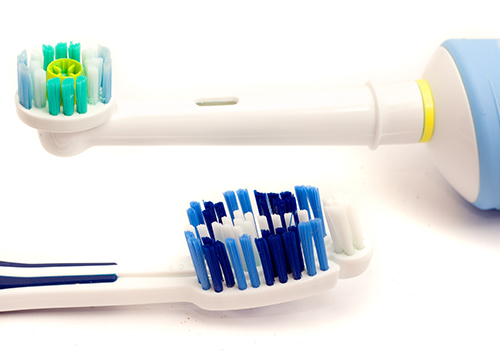May 27th, 2021

Your infant’s first teeth will begin to appear around six to 12 months of age. You might wonder how important these primary teeth really are. After all, baby teeth are destined to fall out within a few years and be replaced by a full set of permanent teeth. However, baby teeth have important functions, and proper care can set the stage for excellent oral and overall health.
Promote Better Nutrition
The appearance of your baby’s primary teeth around six to 12 months of age coincides with changes in your infant’s nutritional needs. Beginning at six months, exclusive breastfeeding is no longer nutritionally sufficient; this is the age at which you should introduce solid foods.
At six to eight months, when your baby can start to chew, strained or pureed fruits and vegetables are appropriate. As your little one’s teeth grow in and chewing abilities progress through 12 months of age, you can gradually add cereal, bread, cooked meats, and other adult foods to his or her nutritious diet.
Increase the Life Expectancy of Baby Teeth
Although baby teeth are inevitably going to fall out and be replaced by permanent ones, making baby teeth last serves an important role that can have benefits into the future. Baby teeth serve as placeholders for permanent teeth. If they decay and fall out too soon, permanent teeth are more likely to grow in crooked.
How to Take Care of Baby Teeth
Your baby’s primary teeth are already in his or her mouth at birth; they are just invisible because they have not broken through the gums. Since they are already present, your baby can get cavities if you do not practice proper oral hygiene from the beginning.
- Do not let your baby fall asleep with a bottle in his or her mouth.
- Brush your child’s baby teeth twice a day as soon as they come in.
- Floss your child’s teeth as soon as he or she has two teeth that touch.
- Visit Fabre Family Dental Care of Marrero for your baby’s first checkup when the first tooth arrives.
May 20th, 2021

You make sure your daughter wears her mouthguard to every soccer practice. Your son doesn’t step on the basketball court without his. Why not protect your smile as well?
Athletes of all ages in team or recreational sports can help prevent dental injuries with a protective mouthguard. If you bike or ski, play racquetball or squash, skate, or sky dive, a mouthguard will help keep your teeth and gums healthy as you keep fit.
Mouthguard Options
Our office will be happy to talk to you about whether a mouthguard is a practical addition to your workout gear. There are many options available to you, including:
Stock: Preformed appliances available at sporting goods stores and drugstores. These are the most affordable, but are a one-size-fits-all option and may not be a comfortable fit for you.
Boil-and-Bite: Also available at sports shops and drugstores. This guard is formed by placing it in hot water and then biting down to allow it to conform to the shape of your mouth.
Custom: Our Marrero office can create a personalized mouthguard just for you. Individual mouthguards are the most durable and comfortable option, in general, and provide the best fit for ease of talking and breathing while exercising. You may also have special dental conditions, such as the placement of crowns or braces, which could be a factor in your decision.
Whichever option you choose, remember to wear your mouthguard regularly while exercising. A proper mouthguard cannot only help prevent injuries to your teeth, but to your face and jaw as well. A healthy smile and a healthy body are a winning combination. The next time you visit Dr. Keith J. Fabre Jr., let’s talk sports!
May 13th, 2021

Imagine this scenario: you go to the dentist to have a cavity filled, and an hour after the procedure you have a runny nose, scratchy throat, and your arms are breaking out in blotchy, red hives. In other words, you’re in worse shape after the visit to the dentist than you were before you walked in to have the cavity fixed. If you experience any of these types of symptoms or side effects, chances are you have a latex allergy.
What is a latex allergy?
A latex allergy is a hypersensitivity to latex proteins. If you have this allergy, the Centers for Disease Control and Prevention recommend that you avoid direct contact with any materials that contain latex. While latex gloves are known to cause allergic reactions in people with a latex allergy, certain metals, plastics, and other materials used in dental care can also cause an adverse response.
A runny nose and itchy eyes are common allergic reactions to latex. However, Dr. Keith J. Fabre Jr. and our team at Fabre Family Dental Care of Marrero want you to know it can also trigger more severe symptoms, including asthma, wheezing, and cardiovascular and gastrointestinal ailments.
A latex-safe dental environment
Many dental offices screen patients for a latex allergy. This is only beneficial, however, if you’re already aware you have a latex allergy. The best thing you can do to ease your allergies is to find a dentist who has a latex-safe environment. A latex-safe dental environment observes the following protocols:
- All patients are screened for a latex allergy.
- No personnel use latex gloves.
- All latex products are removed from the patient’s vicinity, including rubber dams and elastics.
- Work areas contaminated with latex powder are cleaned frequently.
- Signs are posted to communicate all latex allergy procedures in case of an emergency.
If a latex allergy is part of your medical history, then it’s in your best interest to find a latex-free dental environment. To learn more about latex-free dentistry, or to schedule an appointment with Dr. Keith J. Fabre Jr., please give us a call at our convenient Marrero office!
May 6th, 2021

You live in the golden age of toothbrushes. Until a few decades people used twigs or brushes made from animal hair to clean their teeth: not very soft and none too effective.
Now, you have a choice of manual brushes with soft, medium, or hard bristles. Or you might choose to go with an electric toothbrush instead.
Have you ever wondered whether manual or electric brushes provide better cleaning? Actually, they both do the job. The key is to brush and floss every day, regardless of the kind of brush you prefer.
At our Marrero office, we like to say the best brush is the one you'll use. So if you prefer manual, go for it. If you prefer electric, turn it on.
Both types have their advantages but both types will get the job done as far as removing plaque.
Electric Toothbrushes
- Provide power rotation that helps loosen plaque
- Are great for people with limited dexterity due to arthritis or other problems
- Are popular with kids who think the electric brushes are more fun to use
- Can come with variable speeds to help reduce pressure on sensitive teeth and gums
Manual Toothbrushes
- Can help brushers feel they have more control over the brushing process
- Allow brushers to respond to twinges and reduce the pressure applied to sensitive teeth and gums
- Are more convenient for packing when traveling
- Manual brushes are cheaper and easier to replace than the electric versions.
In many ways, the golden age is just beginning. There are already phone apps available to remind you to brush and floss. New apps can play two minutes worth of music while you brush, help you compare the brightness of your smile or help explain dental procedures. Maybe someday we’ll even have programs that examine your teeth after brushing and identify spots you might have missed.




